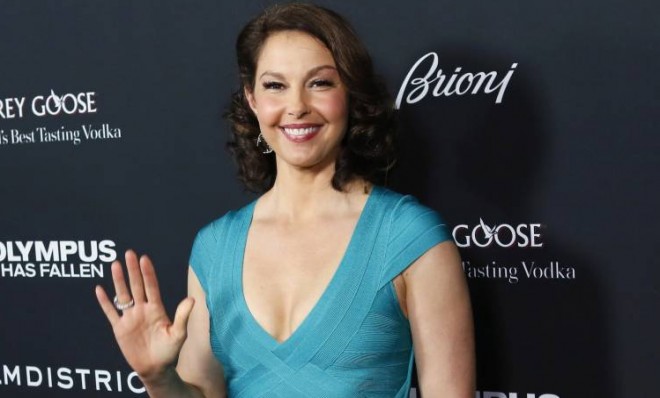Ashley Judd won't run: Why no one wants to take on Mitch McConnell
The senior senator from Kentucky isn't as weak as his poll numbers indicate


A free daily email with the biggest news stories of the day – and the best features from TheWeek.com
You are now subscribed
Your newsletter sign-up was successful
After all the hype her theoretical campaign produced, actress Ashley Judd announced Wednesday that she would not challenge Senate Minority Leader Mitch McConnell (R-Ky.) for his seat in 2014.
The announcement leaves Kentucky Democrats without a prime candidate to oppose McConnell, as many other potential contenders have also declined to get in the ring. The Democratic Party's reluctance comes despite the fact that McConnell has earned the ignominious title of least popular senator in the country.
Months ago, McConnell's miserable approval rating had both Democrats and Tea Party activists excited about their odds of unseating him. A December survey from the Democratic firm Public Policy Polling found that 55 percent of Kentucky voters disapproved of his job performance, the worst mark for any senator the company had polled. In another poll from January, only 17 percent of respondents said they'd vote for him next year, and just one-third of Republicans.
The Week
Escape your echo chamber. Get the facts behind the news, plus analysis from multiple perspectives.

Sign up for The Week's Free Newsletters
From our morning news briefing to a weekly Good News Newsletter, get the best of The Week delivered directly to your inbox.
From our morning news briefing to a weekly Good News Newsletter, get the best of The Week delivered directly to your inbox.
So why did Judd, after all that hype, join the other candidates on the sidelines?
"After serious and thorough contemplation, I realize that my responsibilities & energy at this time need to be focused on my family," Judd wrote in a series of tweets on Wednesday. "Regretfully, I am currently unable to consider a campaign for the Senate."
However, Judd's decision to bow out suggests that McConnell, though not necessarily popular, remains relatively strong. PPP's poll showed that he still led every potential Democratic challenger he was pitted against.
"The reason McConnell does decently well in the head to head matchups despite his poor approval numbers is that even though a lot of Republicans dislike him, most of them would still vote for him in a general election before they would support a Democrat," PPP's Tom Jensen wrote.
A free daily email with the biggest news stories of the day – and the best features from TheWeek.com
The state backed Mitt Romney by a 23-point margin over President Obama last year, and elected Sen. Rand Paul (R) in 2010 by an 11-point margin.
A promised threat from McConnell's right is similarly in doubt. Democrats have said they'd help Tea Party activists launch a primary challenge, but no candidate has emerged. One potential challenger was caught lying about his ties to the Massachusetts Institute of Technology.
McConnell has courted Tea Party leaders and politicians to head off that effort, including Sen. Marco Rubio (R-Fla.), who helped raise $230,000 for his campaign at an event Monday. Paul has also indicated that he would support him.
Jon Terbush is an associate editor at TheWeek.com covering politics, sports, and other things he finds interesting. He has previously written for Talking Points Memo, Raw Story, and Business Insider.
-
 The Week Unwrapped: Do the Freemasons have too much sway in the police force?
The Week Unwrapped: Do the Freemasons have too much sway in the police force?Podcast Plus, what does the growing popularity of prediction markets mean for the future? And why are UK film and TV workers struggling?
-
 Properties of the week: pretty thatched cottages
Properties of the week: pretty thatched cottagesThe Week Recommends Featuring homes in West Sussex, Dorset and Suffolk
-
 The week’s best photos
The week’s best photosIn Pictures An explosive meal, a carnival of joy, and more
-
 The billionaires’ wealth tax: a catastrophe for California?
The billionaires’ wealth tax: a catastrophe for California?Talking Point Peter Thiel and Larry Page preparing to change state residency
-
 Bari Weiss’ ‘60 Minutes’ scandal is about more than one report
Bari Weiss’ ‘60 Minutes’ scandal is about more than one reportIN THE SPOTLIGHT By blocking an approved segment on a controversial prison holding US deportees in El Salvador, the editor-in-chief of CBS News has become the main story
-
 Has Zohran Mamdani shown the Democrats how to win again?
Has Zohran Mamdani shown the Democrats how to win again?Today’s Big Question New York City mayoral election touted as victory for left-wing populists but moderate centrist wins elsewhere present more complex path for Democratic Party
-
 Millions turn out for anti-Trump ‘No Kings’ rallies
Millions turn out for anti-Trump ‘No Kings’ ralliesSpeed Read An estimated 7 million people participated, 2 million more than at the first ‘No Kings’ protest in June
-
 Ghislaine Maxwell: angling for a Trump pardon
Ghislaine Maxwell: angling for a Trump pardonTalking Point Convicted sex trafficker's testimony could shed new light on president's links to Jeffrey Epstein
-
 The last words and final moments of 40 presidents
The last words and final moments of 40 presidentsThe Explainer Some are eloquent quotes worthy of the holders of the highest office in the nation, and others... aren't
-
 The JFK files: the truth at last?
The JFK files: the truth at last?In The Spotlight More than 64,000 previously classified documents relating the 1963 assassination of John F. Kennedy have been released by the Trump administration
-
 'Seriously, not literally': how should the world take Donald Trump?
'Seriously, not literally': how should the world take Donald Trump?Today's big question White House rhetoric and reality look likely to become increasingly blurred
